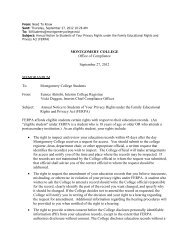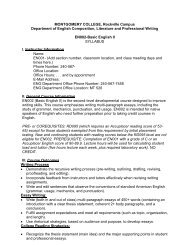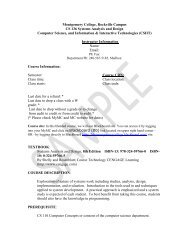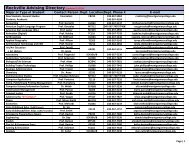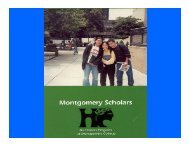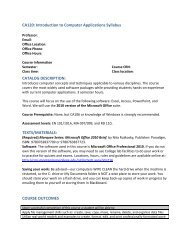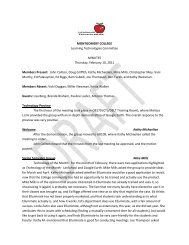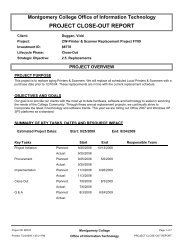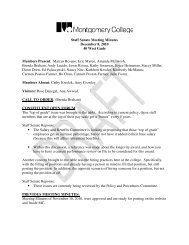Spring 2012 Edition - Montgomery College
Spring 2012 Edition - Montgomery College
Spring 2012 Edition - Montgomery College
Create successful ePaper yourself
Turn your PDF publications into a flip-book with our unique Google optimized e-Paper software.
SPRING <strong>2012</strong><br />
Scholarly Pursuits<br />
VOLUME 12 ISSUE 16<br />
<strong>Montgomery</strong> Scholars Program Newsletter<br />
Global Connections
2<br />
SPRING <strong>2012</strong><br />
Inside This Issue<br />
Schedule of Events ....................... Page 3<br />
Clif’s Notes................................ Page 4<br />
Core Professor Completes Ph.D........... Page 5<br />
Congratulations .......................... Page 5<br />
Scholars Colloquium...................... Page 6<br />
Global Connections......................... Page 8<br />
Thanks!................................... Page 11<br />
New Friends of the Scholars.............. Page 11<br />
From the Director’s Desk<br />
Dear Scholars, Parents, and Friends of Scholars:<br />
The theme of this issue of the newsletter is Global<br />
Connections. This was prompted by the fact that recently<br />
a number of alumni scholars have been studying fairly far<br />
from home, in places such as France, Japan, Mali, South Korea, Spain, and Tajikistan.<br />
Three of the alumni have written about their sojourns abroad. I think you will find<br />
their experiences interesting and a testament to the global reach of the <strong>Montgomery</strong><br />
Scholars Program and <strong>Montgomery</strong> <strong>College</strong>.<br />
As many of you know, our theme during the sophomore year of the program is<br />
globalization. What better testimony to this than following the paths of these students<br />
as they encounter and adapt to other cultures and circumstances? As Gabriella<br />
Behzadi ’08 (“Gaby”) writes: in Scholars and abroad, “the more I learned, the less I<br />
knew” — a strange motto perhaps for an honors academic program, but one which,<br />
I trust, is understandable. Global connections make the world seem smaller, but they<br />
also reveal its infinite riches and complexities.<br />
Making a Difference<br />
for <strong>Montgomery</strong> Scholars<br />
Did you have a “once-in-a-lifetime” experience<br />
with the <strong>Montgomery</strong> Scholars? Join the many<br />
other scholarship supporters and make your<br />
gift now to support current scholars in their<br />
“once-in-a-lifetime” experience. You can make<br />
your gift at our secure, online giving site:<br />
www.montgmerycollege.edu/onlinegiving.<br />
(Click on “Select an area of support” then click<br />
on “Other” and type <strong>Montgomery</strong> Scholars in the<br />
box.) You can also send a check made payable<br />
to <strong>Montgomery</strong> <strong>College</strong> Foundation and write<br />
<strong>Montgomery</strong> Scholars on the memo line.<br />
Send it to: <strong>Montgomery</strong> <strong>College</strong> Foundation,<br />
900 Hungerford Drive, Suite 200, Rockville,<br />
MD 20850. Thank you so much!<br />
Desde el Escritorio del Director<br />
Queridos Becados, Padres y Amigos de Becados:<br />
El tema de este boletín de noticias es Conexiones Globales. Este tema fue inspirado<br />
por el hecho de que recientemente un numero de becados ya egresados han estado<br />
estudiando bastante lejos de casa, en lugares como Francia, Japón, Mali, Corea del Sur,<br />
España y Tayikistán. Tres de estos egresados han escrito sobre su permanencia en el<br />
extranjero. Pienso que ustedes encontraran estas experiencias interesantes y como<br />
un testamento al alcance global del programa de los Becados de <strong>Montgomery</strong> y<br />
<strong>Montgomery</strong> <strong>College</strong>.<br />
Como muchos de ustedes saben, nuestro tema durante el segundo año del programa es<br />
globalización. ¿Que mejor testimonio que el de seguir los caminos de estos estudiantes<br />
a la vez que ellos encuentran y se adaptan a otras culturas y circunstancias? Como dice<br />
Gaby, “entre mas aprendo, menos conozco” - un lema un tanto extraño tal vez para<br />
un programa académico de honores, pero uno, que confío, es entendible. Conexiones<br />
globales hacen el mundo parecer mas pequeño, pero también revela sus infinitas<br />
riquezas y complejidades.<br />
Cover: Gabriella Behzadi ’08 celebrates the grandeur of Tajikistan.<br />
Mary T. Furgol<br />
Director, <strong>Montgomery</strong> Scholars<br />
mary.furgol@montgomerycollege.edu<br />
Scholarly Pursuits
3<br />
SPRING <strong>2012</strong><br />
Some of the Class of 2013 outside the Freer Art Gallery in Washington, D.C.<br />
Schedule of Events<br />
n Skoal for the sophomore Class of <strong>2012</strong> and their families,<br />
scholars faculty, and <strong>College</strong> administrators:<br />
Tuesday, May 15, 6:30–10 p.m.<br />
Gudelsky Building, Rockville Campus<br />
n Picnic for all classes of scholars, past, present, and<br />
incoming, and scholars faculty:<br />
Thursday, May 17, 4–8 p.m.<br />
Bohrer Park, Gaithersburg<br />
n Graduation for Class of <strong>2012</strong>:<br />
Friday, May 18, 9 a.m.<br />
Athletic Field, Rockville Campus<br />
n Afternoon Tea for incoming scholars, Class of 2013, and<br />
their families, scholars faculty, and <strong>College</strong> administrators:<br />
Sunday, May 20, 3–5 p.m.<br />
Theatre Arts Arena<br />
Scholars Picnic, May 2011<br />
<strong>Montgomery</strong> <strong>College</strong><br />
<strong>Montgomery</strong> Scholars Program Newsletter
4<br />
SPRING <strong>2012</strong><br />
Clif’s Notes<br />
By Clif Collins (Core Professor of World Literature)<br />
Arkansas Tar<br />
By 2:00 a.m. we were deep into the Arkansas<br />
boonies — zipping along at 70, 75 miles<br />
an hour somewhere between Little Rock and<br />
Resume Speed — when an inconvenient thought<br />
struck: must be about time for a fill-up. The<br />
probability that we were running low on gas was<br />
by our best calculation, which wasn’t all that<br />
good but, still, all there was to go on since the<br />
gas gauge didn’t work. Ditto the FM radio and<br />
the speedometer. No matter. Uncle Howard was<br />
a free spirit in the car he’d been lusting after<br />
since way back, a red ’67 Camaro convertible<br />
newly liberated from his father-in-law’s chicken<br />
coop, where it had sat for most of the last five<br />
years. And anyhow, we knew the water pump<br />
was solid, installed the day before in Forsyth,<br />
Georgia, after its predecessor blew and left us<br />
sitting on I-75 for an hour and a half. That was<br />
exactly 37 miles from jump, and the mechanic<br />
on duty guaranteed us the car would make it<br />
the rest of the way. Most likely.<br />
It was an inauspicious start to a trip bound<br />
for strangeness, and here was Howard’s voice<br />
somewhere out on the edge of near-sleep,<br />
calling for a fresh calculation … divide 380 by<br />
16, there’s a pen in the console … fresh t-shirt<br />
in the ice chest, credit card, Waffle House next<br />
exit. A pothole shook me closer to waking, and<br />
I sat up to take stock of the surroundings. Black<br />
woods on both sides of the highway, punctuated<br />
every now and then by a billboard, and on we<br />
rattled in the hum and fumes of that car, top<br />
down, air still thick with early July heat even as<br />
2:30 crept closer and the night deeper. Somewhere<br />
along there I must’ve drifted back off and<br />
found <strong>Spring</strong>steen zipping through a scene of<br />
Deliverance.<br />
Soon enough — David Lynch be praised — we<br />
were back on the road. Now, I’m not sure what<br />
the sociological term for such tribal distinctions<br />
might be, although I’m sure there is one. Boil it<br />
down to this, and take it from one who speaks<br />
with authority on very few things but is confident<br />
here: The South is not all the same. And I’m not<br />
even considering Atlanta, which is only southern<br />
in the tourist sense, or all of Florida south of the<br />
panhandle, which is closer to Piscataway than<br />
Appomattox. No, the southern U.S. is a very<br />
diverse place, like South America. Or Scotland.<br />
Fact is, not everyone even follows NASCAR,<br />
and there really is a bona fide middle class.<br />
You won’t find balloon tars just anywhere. Tires<br />
either. You will, however, find the best food on<br />
earth, and all of it deep-fried except for the<br />
sweet tea you wash it down with. There are socalled<br />
healthier menus, for sure — tofu, yogurt,<br />
vegan casseroles … aka, carpetbagger staples.<br />
(Yep, I know Maryland is below the Mason-Dixon<br />
Line. I also know it touts itself as mid-Atlantic,<br />
which is code for “We don’t use lard in our<br />
recipes, and our college football is lousy.”)<br />
Fortunately, the scholars have been given<br />
Asheville, North Carolina, the South’s equivalent<br />
of Funkytown. Not only is Asheville a terrific<br />
small city, it’s also the perfect setting for a first<br />
dip into southern culture. Aside from the<br />
abundance of food offerings and used bookstores,<br />
there are also quite a number of music<br />
venues and a vibrant theater community.<br />
Couple that with a minor league baseball<br />
team and frequently stunning views of the Blue<br />
Ridge Mountains, and it’s not a half-bad spot<br />
for sweating out two weeks in brutal July. The<br />
Celtic harp playing doesn’t hurt either.<br />
Little wonder, then, that Warren Wilson <strong>College</strong><br />
has also become a prime destination for a<br />
number of summer programs and conferences,<br />
including the Swannanoa Gathering, which<br />
features several week-long workshops each<br />
summer, ranging from Celtic music to Appalachian<br />
fiddle playing and quite a bit beyond. It’s<br />
not just everywhere you can hear the theme<br />
from The Brady Bunch set to a blues riff, which<br />
says a lot for the infusion of humor and laid-back<br />
style that’s also found there. The long-standing<br />
success of both WWC and the Gathering, no<br />
doubt, hinges on the people involved, which<br />
brings us to a couple of individuals who have<br />
been instrumental (note White-icism) in making<br />
this venture work for the Scholars Program.<br />
Liz Brace, Conference Coordinator for Warren<br />
Wilson <strong>College</strong>, and Nicole Veilleux, Swannanoa<br />
Coordinator, have been invaluable in their<br />
assistance and tremendously patient in answering<br />
my addled questions … usually more than<br />
once. It’s their kind of gracious hospitality that<br />
has all of us in the <strong>Montgomery</strong> Scholars looking<br />
forward to this new opportunity in Asheville.<br />
My next semi-lucid reckoning had a man standing<br />
beside the car, mumbling something about<br />
tar. It was very odd. Who knew tar could incite<br />
such enthusiasm? And he was very enthusiastic.<br />
I suppose my eyes must have been open, and<br />
he must have believed an actual conversation<br />
was possible. While the driver was inside paying,<br />
I sat in the glow of the half-lit pumps, listening<br />
and watching and becoming sort of fascinated,<br />
really, as this guy grew more and more animated.<br />
The blacked-out sky and a tall, disheveled<br />
station attendant hovering over the car in the<br />
throes of some near-religious ecstasy brought<br />
on by … tar?? Only then it wasn’t tar anymore.<br />
As I sat staring goggle-eyed and doing my level<br />
best to concentrate, this: his words suddenly<br />
shifting into coherence and running full throttle<br />
toward actual sentences, as in My cousin<br />
Dwayne had a ’68. Bored out the motor and put<br />
in new heads and added a Herst. Also balloon<br />
tires. [Not tars, see?] Tires are what made it.<br />
All this’n’s missing — good set of balloon tires.<br />
In this new venture, the <strong>Montgomery</strong> Scholars<br />
Program has been fortunate to join up with<br />
Warren Wilson <strong>College</strong>, which will host the<br />
scholars both weeks. For those unfamiliar with<br />
Warren Wilson, the school is a fascinating story<br />
in and of itself. Founded in 1894 as the Asheville<br />
Farm School, Warren Wilson <strong>College</strong> today is<br />
a true educational innovator, joining a weekly<br />
work commitment and community service to its<br />
academic requirements. It has been named by<br />
Sierra Club’s magazine as one of the greenest<br />
colleges in the nation, and with a study-abroad<br />
program utilized by 70 percent of the student<br />
body, WWC truly is a small school with a large<br />
worldview. Overall, the college prides itself<br />
in providing a practical, real-world education<br />
that students are able to build from long after<br />
graduation. “We’re not for everyone … but then<br />
maybe you’re not everyone,” reads the Warren<br />
Wilson brochure, one of very few that can’t be<br />
accused of bait-and-switch advertising in its<br />
campus photos.<br />
Warren Wilson Bridge<br />
Scholarly Pursuits
5<br />
Core Professor<br />
Completes Ph.D. with<br />
a Scottish Theme<br />
CONGRATULATIONS!<br />
Births<br />
Congratulations to Heidi (York) Payne ’01 and her husband, Josh, on<br />
the birth of their third son, Caleb Michael Payne, on December 5, 2011; to<br />
Christina (Choi) Smart ’02 and her husband, Luke, on the birth of their<br />
son, Jude Dennison Smart, on January 31, <strong>2012</strong>; to Amy Gueye-Goudiaby<br />
’03 and her husband, Papis, on the birth of their son, Souleymane Assefa<br />
Goudiaby, on August 24, 2011; to Estefania Menendez Ellis ’05 and her<br />
husband, Stephen, on the birth of their daughter, Sophia Ellis, on August<br />
16, 2011; to Lauren Minard Rohwer ’06 and her husband, Paul, on the<br />
birth of their daughter, Esme Pearl Rohwer, on December 11, 2011; to<br />
Mary (Megorden) Wilson ’07 and her husband, Jimmy, on the birth of<br />
their daughter, Claire Megorden Wilson, on September 17, 2011; and to our<br />
senior administrative aide, Lashon Banks, and her husband, Will, on the<br />
birth of their son, Noah Alexander Banks, on September 12, 2011.<br />
SPRING <strong>2012</strong><br />
Caleb Michael Payne Jude Dennison Smart Sophia Ellis<br />
Esme Pearl Rohwer Claire Megorden Wilson Noah Alexander Banks<br />
Professor Cheryl Tobler completed her<br />
Doctorate of Philosophy in ethnomusicology at<br />
the University of Maryland in December 2011.<br />
Her dissertation is titled “Breathing It In: The<br />
Musical Identity of the Scottish Travelers.”<br />
Dr. Tobler has taught World Music in the Core<br />
Curriculum for the past three years and also<br />
performs locally. Congratulations, Dr. Tobler,<br />
we are more than a wee bit proud of your<br />
accomplishments!<br />
Wedding<br />
We also congratulate Nicholas Tedesco ’03 on his marriage<br />
to Rachel Quinones on January 21, <strong>2012</strong>.<br />
<strong>Montgomery</strong> <strong>College</strong><br />
<strong>Montgomery</strong> Scholars Program Newsletter
6<br />
SPRING <strong>2012</strong><br />
Jonathan Jayes Green presents project<br />
Scholars Colloquium<br />
By Gaby Gomez (Class of 2013)<br />
Samantha Cameron presents project<br />
As feelings of enthusiasm and apprehension filled the air in the scholars-filled Theatre<br />
Arts Building, it became clear that the Capstone Colloquium of <strong>2012</strong> was well underway.<br />
Armed with both confidence and months of preparation, the sophomore scholars revealed to<br />
the crowd of peers, relatives, and educators their satisfaction in having tackled the arduous<br />
task that is the Capstone Project. Although the projects posed an initial challenge, the scholars<br />
had gradually traded those feelings of intimidation for new ideas and a growing sense of<br />
insight and mastery.<br />
The Capstone project, assigned during the second year of the <strong>Montgomery</strong> Scholars Program,<br />
is a culminating research-based assignment that allows the scholars to delve into a more<br />
thorough understanding of their interests in the context of globalization. The project presents<br />
each student with the opportunity to explore a wide array of topics and establish his or her<br />
own interconnection with globalization. Though the journey at times proved rough, scholars<br />
were able to choose topics that were directly related to their major. As a result, they not only<br />
made progress toward completing their project, they became more versed in their chosen<br />
field of study and its global implications.<br />
This academic growth was reflected in the work of Anh Nguyen, a biological sciences<br />
major who examined globalization as a double-edged sword, noting its dual role in both the<br />
spread and prevention of infectious diseases. Nguyen revealed how increased global mobility<br />
has exacerbated the threat of infectious diseases while also paving the way for the rise of<br />
international institutions bent on thwarting those very biological threats.<br />
Mpho Mafune presents poster<br />
Benjamin Foltin outlined the shortcomings of piracy laws like the Protect IP Act (PIPA) and<br />
the Stop Online Piracy Act (SOPA) in seeking to eliminate copyright infringement, but also<br />
inhibiting global communication and encouraging Internet censorship. He elaborated on how,<br />
under these laws, the simple act of posting a song lyric on Facebook could grant authorities<br />
license to shut the entire website down.<br />
Julia Branco discussed the use of new media tools to promote change and enable the<br />
empowerment of the individual, as demonstrated by the 2011 Egyptian revolution — an<br />
uprising against the oppressive regime of Hosni Mubarak. She further explored this<br />
phenomenon by relating how the uprising was ignited through Facebook groups that<br />
advocated the need for protest. Moreover, she depicted how, through social networking sites<br />
like Twitter, citizen journalism became the primary medium for disseminating information and<br />
awareness about this modern revolution.<br />
Engrossing the audience was Samantha Cameron’s presentation, “Harry Potter and the<br />
Emerging Legend: Corporations and Modern Myth in a Globalized World,” an analysis of how<br />
integrated media conglomerates are corroding the existence of the modern mythical tale by<br />
transforming it into a franchise. Cameron described the function of the hero archetype, along<br />
with many other traditional symbols and roles, present in characters of Greek, medieval, and<br />
Kevin Puetate presents poster<br />
Scholarly Pursuits
7<br />
SPRING <strong>2012</strong><br />
Class of <strong>2012</strong> after the Colloquium<br />
modern literary text — in particular, the Harry<br />
Potter series. When legal disputes arise over<br />
copyright infringement of the popular series,<br />
the reasons for suing include the unauthorized<br />
reproduction of aspects of the characters,<br />
not the story in its entirety. A court ruling<br />
suggested that Warner Brothers (which owns<br />
the Harry Potter franchise) has a copyright on<br />
the archetypal aspects of the series but not<br />
the series itself. This raises the implication<br />
that an archetype — what Carl Jung defined as<br />
inborn tendencies that shape human behavior —<br />
is now subject to corporate ownership.<br />
The scholars graciously pointed out those who<br />
had helped them on the road to this night of<br />
research presentations. Ms. Carolyn Terry,<br />
Dean of Humanities and collegewide honors<br />
dean, acknowledged the high school teachers,<br />
nominated by the scholars, who had played<br />
an integral role in their academic success. Many<br />
of the scholars wrote glowing introductions<br />
for their teachers, outlining their efforts and<br />
conveying their gratitude for their positive<br />
influence. The convivial atmosphere of the<br />
colloquium was enriched by these recognitions,<br />
as scholars proudly stood next to the educators<br />
who had molded them into independent thinkers<br />
and pushed them to challenge themselves.<br />
As the night came to a finish, there was a strong<br />
sense of camaraderie among the scholars. This<br />
project had, in a way, transcended its academic<br />
purpose and become a unifying force for the<br />
scholars; they had relied on each other for<br />
support and aided one another through speech<br />
practices and poster decorating. And while<br />
the presentations were praiseworthy, the true<br />
success of the scholars was marked by the<br />
insight they had gained from it. Encouraged by<br />
Dr. Aram Hessami, audience members asked<br />
the students questions that extended beyond<br />
what they stated in the presentations. The<br />
result: sound responses that illustrated how<br />
well the scholars had come to employ critical<br />
thinking in a global context.<br />
It was an occasion that marked not only the<br />
completion of a rigorous two-year program but,<br />
as Capstone mentor Dr. Hessami humorously<br />
put it, “the last night of the journey, after [which]<br />
I think everyone in America will be relieved.” It<br />
was also a night that, to quote Professor Sen,<br />
“faculty and scholars [realized] the difficulty of<br />
the undertaking,” but more importantly, “what it<br />
[meant] to them and to us.”<br />
Colloquium<br />
<strong>Montgomery</strong> <strong>College</strong><br />
<strong>Montgomery</strong> Scholars Program Newsletter
8<br />
SPRING <strong>2012</strong><br />
GLOBAL CONNECTIONS<br />
Tajikistan<br />
Gabriella Behzadi ’08<br />
When Dr. Furgol asked me to write briefly<br />
about my travels, I was excited to have<br />
the opportunity to share my adventure with the<br />
scholars community. Now, four months later<br />
and stressing about what to write, I realize that<br />
one thing has not changed since my days in<br />
the <strong>Montgomery</strong> Scholars program: deadline<br />
anxiety. I guess old habits die hard, even after<br />
two-and-a-half more years of undergraduate<br />
study at the University of Maryland and one year<br />
of intensive study of the Persian languages of<br />
Farsi, Tajik, and Dari in Dushanbe, Tajikistan.<br />
You’d think a girl would learn. Perhaps I haven’t<br />
perfected time management (I promise, Professor<br />
Woodhouse, I have done every trick in the<br />
book!), but I can confidently say that, during my<br />
year of study in Tajikistan, I had experiences<br />
that reinforced what I learned in the Scholars<br />
Program: Throw away all preconceived notions<br />
of how you think the world works. Now. An<br />
example: I knew that the population of Tajikistan<br />
was predominantly Sunni Muslim, so I expected<br />
women to wear conservative dress, drab colors,<br />
and head coverings. Sure, some did, but many<br />
didn’t. I found out that many women wore<br />
multi-patterned scarves only around their hair,<br />
and they wore the most gorgeous, colorful, and<br />
loud-patterned dresses you ever saw. If you are<br />
looking at the photos, yes, the dresses look like<br />
muumuus, and yes, they are amazing. I now<br />
own four.<br />
What about the other typical things that are<br />
a part of travel, you ask. Food? Landscapes?<br />
People? The food was an acquired taste for<br />
many students in my cohort. It is oil-heavy<br />
and, in my opinion, delicious. I miss the huge<br />
communal plates of the national rice pilaf dish,<br />
osh. More than that, I miss eating and breaking<br />
bread (quite literally, and at every meal) with my<br />
host family. The hospitality I experienced with<br />
my host family was extended to me again and<br />
again by people I met throughout Tajikistan,<br />
even when traveling to the farther reaches of<br />
the country, like Khorog and Khujand, and to<br />
the Pamirs, the autonomous region bordering<br />
Tajikistan, China, and Afghanistan. Despite the<br />
unbelievable linguistic variability among the<br />
residents of the small towns I visited, where it<br />
was difficult for me at times to buy delicious<br />
and fresh pomegranates, or find where the<br />
nearest squat toilet was, I was always offered a<br />
cup of hot choi (tea), offered the best fruit, and<br />
constantly encouraged to eat more (even if I<br />
was full to the brim with osh or lakmand). The<br />
hospitality I received really set the tone for an<br />
amazing experience wherever I traveled.<br />
In the year prior to my arrival, President Imomali<br />
Rahmon announced that all businesses and<br />
government offices must switch all documents<br />
from Russian to Tajik in a push for nationalization<br />
of the Tajik language. Despite this edict, you<br />
can imagine the remnants of Soviet influence,<br />
mixed with Persian, in every aspect of life. For<br />
example, the architecture: block apartment<br />
buildings and imposing statues of Lenin and<br />
Persian poets like Rudaki. Oh boy, were the poets<br />
important! If you couldn’t think of an elaborate<br />
toast when drinking vodka at a wedding or a<br />
circumcision celebration, then you better have<br />
memorized an appropriate poem. That was a<br />
hard and embarrassing lesson to learn. I gave<br />
a simple toast at a wedding and said, “To your<br />
good health and long marriage.” *Crickets<br />
chirping …*<br />
You can imagine me and my classmates trying<br />
to navigate our way through multiple languages<br />
with cultural sensitivity as best we could. As<br />
in the Scholars Program, the more I learned<br />
the less I knew. And the more I kept my eyes<br />
open, the more in awe I became of the seemingly<br />
never-ending chains of gorgeous snow<br />
capped mountains, of the beautiful valleys, of<br />
the vivid colors. Despite the quiet, slow (and<br />
for me, welcome) pace of life, often paired with<br />
images of grayness, there are splashes of color<br />
everywhere you look. They are in the dresses, in<br />
the fruit, in my host family, and in the amazing<br />
individuals whom I was lucky to meet from all<br />
over the world. They are also in the foreigners<br />
learning the language and working in embassies<br />
or at one of the many aid organizations operating<br />
out of Tajikistan. In fact, during my stay I saw all<br />
five sides of Dr. Hessami’s international relations<br />
pentagon (Remember, scholars? Government,<br />
inter-governmental organizations, NGOs, big<br />
business, and the media.)<br />
It would take a Capstone project’s worth of<br />
space and time to elaborate on that last point,<br />
so allow me to end by inviting you — scholars,<br />
alumni, and professors — to sit, accept a cup<br />
of choi, and I will share my best fruit and raise<br />
a long toast to your health, happiness, and<br />
never-ending quest for new experiences.<br />
Scholarly Pursuits
9<br />
Mali<br />
Ana Palomino ’10<br />
Having grown up in a culture where<br />
questions like, “How many wives are<br />
you planning on having?” have never been<br />
particularly relevant when talking to my male<br />
peers, questions like these became my favorite<br />
topics during my three-and-a-half months stay<br />
in Bamako, Mali. I came to Mali with 15 other<br />
students from all over the United States, and<br />
more than half of these were females who were<br />
assigned to polygamist host families. Lucky<br />
for me, one of my older host-brothers would<br />
always take me along to hang out with him and<br />
his friends, where I had ample opportunity to<br />
ask these seemingly intrusive questions. I was<br />
surprised to learn that my Malian peers were<br />
looking to have only one wife. I began making<br />
conclusions about the generation gap and the<br />
influence of Western culture. When I started<br />
thinking I had actually figured it out, a familiar<br />
voice popped into my head, and it occurred to<br />
me to ask another follow-up question: “What if<br />
your wife can’t have kids?”<br />
“Well, then I’d have to get another one,” became<br />
a much more common, yet still not the only,<br />
answer. The <strong>Montgomery</strong> Scholars Program,<br />
particularly Professor Furgol, molded this<br />
thought process in me. The Core Curriculum<br />
taught me to think about and ask the right<br />
questions, while instilling a strong and inherent<br />
fear of making generalizations. The Core Curriculum,<br />
paired with the second-year Capstone<br />
experience, taught me to express these thought<br />
processes in writing. If you had set me loose<br />
in Bamako before I had gone through the<br />
Capstone experience, told me to “write a 30-<br />
page independent study,” and checked on me a<br />
month later, I have serious doubts that I would<br />
have been able to produce a coherent result for<br />
you. However, the Capstone experience gave<br />
me the skills and, better yet, the confidence to<br />
do just that. After less than a month of running<br />
rampant through Mali’s ministry of education,<br />
observing public school classrooms, surveying<br />
youth, and conducting formal interviews, I<br />
completed an independent study project on the<br />
benefits of local language classroom instruction<br />
and its potential role in development, something<br />
I plan to expand on in my last semester at<br />
St. Mary’s <strong>College</strong> of Maryland.<br />
What about my personal growth? My arrival in<br />
Bamako marked the beginning of an intensified,<br />
slightly more humiliating version of toddlerhood.<br />
At the awkward, bumbling age of 21, I had to<br />
re-learn how to share, speak, eat, and practice<br />
proper bathroom behavior in the context of<br />
another culture and language. For the semester,<br />
having a bed worked on a first-come-first-serve<br />
basis as I shared it with one or two home-stay<br />
sisters in a room with two or three others<br />
(depending on the night). I can now argue<br />
very well in French. The only reason why<br />
anyone ever spoke French in my house was<br />
for my convenience — otherwise, it was strictly<br />
Bambara, a language I had not even heard of<br />
before arriving but ended up loving. Up until<br />
my last day, I was still struggling to use my<br />
right-hand as a tool to scoop rice out of the<br />
community bowl with any sort of grace.<br />
Washing out a bucket filled with well-water<br />
and using the “left-hand-tea-kettle-method”<br />
as opposed to toilet paper were also big trialand-error<br />
challenges up until my last day.<br />
The skills I learned in the <strong>Montgomery</strong> Scholars<br />
Program taught me to embrace my cultural<br />
incompetence and appreciate it all as the most<br />
intense, yet fun, learning experience of my life.<br />
Scholars helped me process the overwhelming<br />
amount of information and ultimately adapt<br />
to a culture that is so dramatically different<br />
from my own.<br />
Postscript:<br />
After the military coup in Mali in March <strong>2012</strong>,<br />
we contacted Ana to see if she had heard from<br />
her host family. In reply, Ana wrote: “As soon<br />
as I read about the coup d’etat, I called my<br />
host brother, Tiess, to ask whether he and the<br />
rest of the family were alright. He explained<br />
that the night before was pretty scary but that<br />
things had calmed down by the next morning.<br />
Everyone in the family is okay, and for now they<br />
are all sticking close to home.”<br />
Since returning from Mali, Ana has entered her final<br />
semester at St. Mary’s <strong>College</strong> and is taking a class with<br />
one of our roundtable speakers, Dr. Bjorn Krondorfer,<br />
called Religion in Violence: Torture, Genocide and<br />
Reconciliation. Dr. Krondorfer recommended Ana to<br />
participate in a Race Reconciliation retreat with him and<br />
another professor and 15 other St. Mary’s students.<br />
SPRING <strong>2012</strong><br />
Global Connections<br />
<strong>Montgomery</strong> <strong>College</strong> <strong>Montgomery</strong> Scholars Program Newsletter
10<br />
SPRING <strong>2012</strong><br />
GLOBAL CONNECTIONS<br />
South Korea<br />
continued<br />
Sarah Stogsdill ’10<br />
am currently a psychology major at Grove City <strong>College</strong> in Grove City,<br />
I Pennsylvania. My school has an exchange program with Seoul<br />
Women’s University (SWU) in Seoul, South Korea, and I was accepted<br />
in the Bahrom International Program at SWU on scholarship for the<br />
summer of 2011. The program is offered thorough Korean cultural<br />
and language studies, which count as a global elective for Grove<br />
City <strong>College</strong>.<br />
Because of my participation in the <strong>Montgomery</strong> Scholars Program,<br />
I developed a passion for other cultures. During the Core classes,<br />
I learned about a broad range of art expression and thought from<br />
all over the world and got a taste of international travel during<br />
the Cambridge experience. I learned the importance of studying a<br />
culture in its entirety and from multiple angles. One of the things<br />
I loved the most about the Bahrom International Program at SWU<br />
was the exposure to every aspect of Korean culture. I attended<br />
lectures on Korean history, economics, language, cuisine, film,<br />
music, traditional dress, and foreign policy, to name a few. The<br />
program also took us on day and weekend trips all around<br />
Korea — to ancient folk villages, famous museums, and the<br />
Demilitarized Zone on the border with North Korea.<br />
For the most part, I lived in a dorm suite with Korean students,<br />
but I also stayed a few nights with two different families; ate at<br />
their tables, attended their churches, and loved every minute of<br />
it. Scholars taught me how to learn: how to keep my eyes and<br />
my mind open. Korea taught me to love: to embrace differences<br />
and enjoy similarities, to thank someone with my eyes when my<br />
few Korean phrases were not enough, to value being part of a<br />
community more than my role as an individual. I also learned<br />
that smiles are truly a universal language.<br />
Scholarly Pursuits
11<br />
Thanks!<br />
ROUNDTABLE PRESENTERS GUEST LECTURERS<br />
The Scholars wish to thank the following individuals for their generous<br />
contributions of time and talents during this academic year:<br />
&<br />
New Friends of the Scholars<br />
Congratulations to our new Friends of the Scholars. The following<br />
high school teachers and mentors were nominated by sophomore<br />
scholars because of the influence these educators had on them<br />
during their educational careers:<br />
SPRING <strong>2012</strong><br />
Charles Alexander<br />
Northwood High School<br />
Nominated by Brogan Murphy<br />
Joyce Bailey<br />
Poolesville High School<br />
Nominated by Claire Jones<br />
Roundtable with <strong>Montgomery</strong> <strong>College</strong> alumna Elizabeth Keaney (center)<br />
Mariano Ramos ’01 (left) demonstrates the cultural magic of food<br />
Jo Johnson<br />
Richard <strong>Montgomery</strong> High School<br />
Nominated by Sairam Nagulapalli<br />
Julien Labiche<br />
Liberty’s Promise at<br />
Kennedy High School<br />
Nominated by<br />
Jonathan Jayes Green<br />
Mr. Steve Di Girolamo George Scheper, Ph.D. Forrest Hall, Ph.D.<br />
Laurie Mannino<br />
Magruder High School<br />
Nominated by Callie Kambanis<br />
Bjorn H. Krondorfer, Ph.D. Professor Rebecca Cartwright<br />
Martha Custis Peters (George<br />
Washington’s granddaughter)<br />
Elizabeth Keaney<br />
Historic Interpreter and<br />
Assistant Educator,<br />
National Museum of Women<br />
in the Arts<br />
Japanese Tea Ceremony<br />
Mr. Steve Di Girolamo<br />
Latin America<br />
George Scheper, Ph.D.<br />
Faculty Associate,<br />
Advanced Academic Programs,<br />
Center for Liberal Arts,<br />
The Johns Hopkins University,<br />
Coordinator of Humanities,<br />
CCBC – Essex<br />
Aram Hessami, Ph.D.<br />
Quantum Physics:<br />
Perception and Reality<br />
Forrest Hall, Ph.D.<br />
Goddard Space Center<br />
The Holocaust and Memory<br />
Bjorn H. Krondorfer, Ph.D.<br />
Professor of Religious Studies,<br />
St. Mary’s <strong>College</strong> of Maryland<br />
Middle East Simulation<br />
Professor Rebecca Cartwright<br />
Post-Modern Thought<br />
Aram Hessami, Ph.D.<br />
Food & Culture<br />
Mr. Mariano Ramos ’01<br />
Engineer and Chef<br />
Maureen Murphy<br />
Paint Branch High School<br />
Nominated by Yves Gomes<br />
Debra Reier<br />
Sherwood High School<br />
Nominated by Samantha Cameron<br />
Theresa Wright<br />
Parent Resource Teacher, ESOL & Bilingual Programs<br />
Watkins Mill High School<br />
Nominated by Kevin Puetate<br />
<strong>Montgomery</strong> <strong>College</strong><br />
<strong>Montgomery</strong> Scholars Program Newsletter
SPRING <strong>2012</strong><br />
<strong>Montgomery</strong> Scholars Program<br />
51 Mannakee Street, SV 107B<br />
Rockville, MD 20850<br />
Nonprofit Org.<br />
U.S. Postage<br />
PAID<br />
Suburban, MD<br />
Permit No. 97<br />
<strong>Montgomery</strong> Scholars Program Newsletter<br />
Scholarly Pursuits<br />
VOLUME 12 ISSUE 16<br />
Information<br />
<strong>Montgomery</strong> Scholars Program<br />
www.montgomerycollege.edu/<br />
admissions/MCScholars<br />
<strong>Montgomery</strong> <strong>College</strong><br />
www.montgomerycollege.edu<br />
Comments, feedback,<br />
or input, please e-mail:<br />
mary.furgol@montgomerycollege.edu<br />
Produced by the Office of Communications, 04/<strong>2012</strong><br />
<strong>Montgomery</strong> <strong>College</strong> is an academic institution committed<br />
to promoting equal opportunity and fostering diversity<br />
among its students, faculty, and staff.<br />
Scholarly Pursuits<br />
SPRING <strong>2012</strong>




